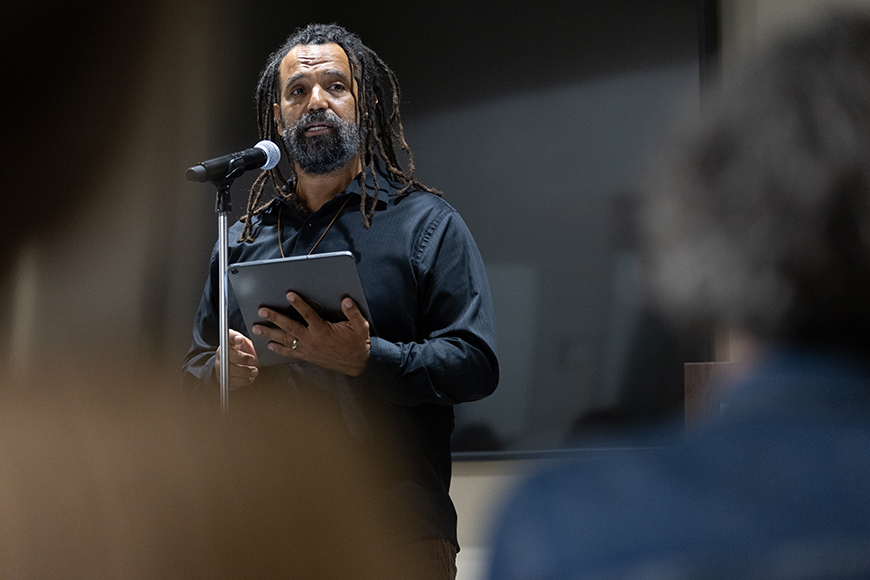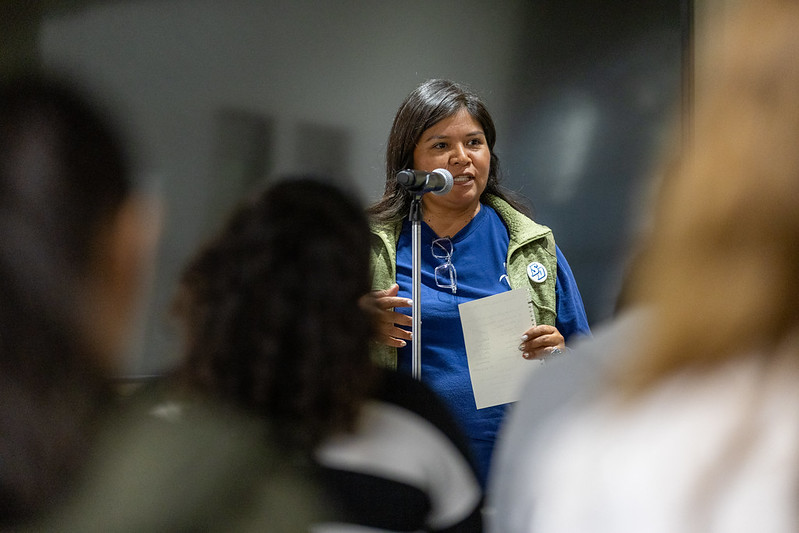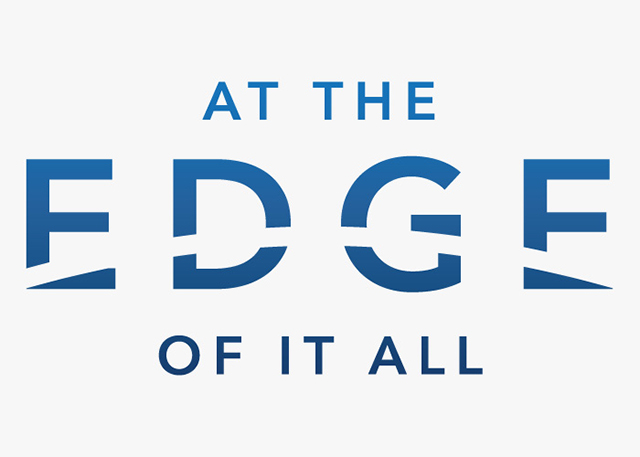Building Connection and Allyship Through Storytelling
‘There’s More’ Live Podcast Honors Native American Heritage Month with Personal Stories of Collaboration
 Ethnic Studies Associate Professor Jesse Mills, PhD, shares a personal story during There’s More LIVE in the Humanities Center on Thursday, Nov. 9, 2023. (Photo by Matthew Piechalak)
Ethnic Studies Associate Professor Jesse Mills, PhD, shares a personal story during There’s More LIVE in the Humanities Center on Thursday, Nov. 9, 2023. (Photo by Matthew Piechalak) USD Tribal Liaison Sahmie Wytewa made a simple, pointed request to the audience of colleagues and students gathered before her inside the Humanities Center.
“Whatever you take away from tonight, share it forward,” she urged her fellow Toreros.
There’s More hosted its latest live storytelling event on Nov. 9. The installment, “The Privilege, Power & Politics of Decolonizing Education,” was a partnership between the student-run storytelling program and the Office of the Tribal Liaison. It was held to coincide with Native American Heritage Month.
“Tonight, we are building a community that embraces inclusivity for all students,” explained Wytewa, who joined USD last school year. “In creating the theme, I thought rather than telling my story, how about we share our story as a collective, as contributors and co-conspirators of the work of the Office of the Tribal Liaison.”
The evening’s storytelling lineup consisted of Outdoor Adventures Assistant Director Mark Ceder, MS; Lily Giovannelli, speaker pro-temp of USD Associated Student Government; and Ethnic Studies Associate Professor Jesse Mills, PhD.
Each storyteller shared a candid, personal narrative centered on the unique collaboration they have cultivated with Wytewa. The stories were honest, insightful and intended to illustrate the importance of relationship-building in the ongoing work Wytewa does at USD.
Ceder's story detailed an Outdoor Adventures camping trip to Anza Borrego State Park, specifically a transformational early morning desert walk with Wytewa.
“The story is evidence that the Office of the Tribal Liaison and Sahmie in particular are building capacity at USD,” said Ceder. “Sahmie’s building capacity is consciousness, an understanding of the ability to truly see and support Native students and we are all building capacity to embrace the spirit of not knowing how far our collective work reaches.”
Giovannelli’s story highlighted her initial meetings with Sahmie, who she said enthusiastically embraced the opportunity to work with students from ASG.
“She sets up her actions to have a continuing conversation,” Giovannelli said. “This is an extremely important lesson she taught me and all of our student leaders … that our interactions can mean so much more than efficiency and professionalism — they should be about caring for each other, for our community and cultivating relationships in order to create a better, more welcoming space anywhere, but specifically here at USD.”
Mills' story, “Unfinished,'' was told in three distinct parts and highlighted the past, current and future of the Office of the Tribal Liaison.
“To summarize, my career at USD, now in my 18th year, has been in large part about helping to build Ethnic Studies and working with Native students, professors, communities and tribal leaders has made that work about relationships, knowledge, growth, healing and decolonizing,” Mills said. “I’m thankful to have been a part of building the Office of the Tribal Liaison and I’m thankful for you, Sahmie, for inviting me to share my story today.”
Storytelling is a vital component of Native and Indigenous cultures, said Wytewa, a member of the Hopi Tribe from the village of Mishongnovi in Second Mesa, Arizona. She is the second tribal liaison at USD, which piloted the position and 2012 and institutionalized the role in 2014.
“It’s how we pass history and create milestones,” Wytewa said. “Even the stories you tell your friends or talk about in class — you are creating memories inside of yourself.”
There’s More is a storytelling platform that hosts monthly live events where guests “share meaningful experiences of the human condition.” The initiative began six years ago and is co-sponsored by the Humanities Center, the Changemaker Hub and USD’s College of Arts and Sciences.
The overall goal is to amplify the importance of storytelling for both the humanities and Changemaking, explained Keeling, who serves as faculty producer.
“So often, when people think of telling a story, they fall into lecture-mode and do explanatory work,” said Keeling, who teaches COMM 333: Podcast Storytelling, where students learn rhetorical skills in affect and audience adaptation. “I work with people to help them structure it into a person-centered narrative about a time in their life when they had to face or overcome a challenge.”
Student producers lead the programming for There’s More live events, as well as craft and edit stories, maintain the podcast website, write blog posts and create podcast playlists for themed content. All of the stories told around Native and Indigenous cultures have recently been compiled into a playlist titled Native@USD.
“Giving voice to Native individuals on campus is incredibly important and I feel honored to have the privilege to be a part of this process,” said student producer Stella Hess. “Amplifying Native voices is vital for fostering inclusivity and diversity within the USD community. Hearing stories from those who come from different backgrounds can teach us so much about the richness of the human experience.”
Hosting the monthly storytelling events is a way to build culture and cohesion at USD, added Keeling.
“Real change isn’t going to happen through argumentation because people typically have their opinions set,” she said. “Storytelling can be a form of empathy and understanding someone’s life experience … that pathos is more important than the logos.”
— Story and photos by Matthew Piechalak




